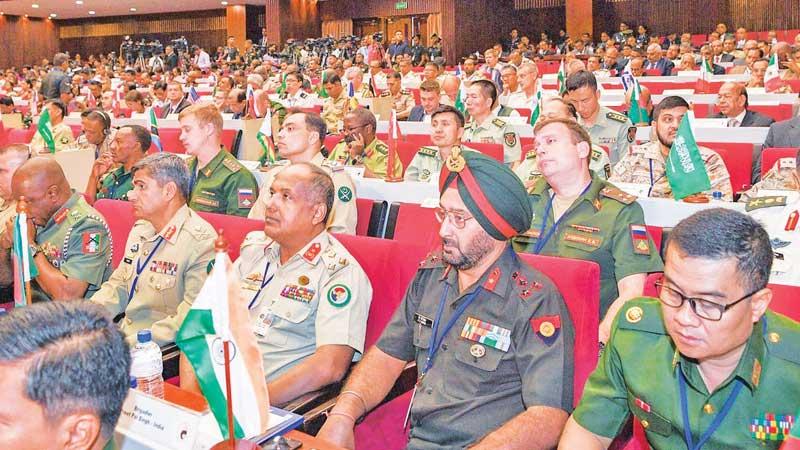
The Colombo Defence Seminar organised by the Sri Lanka Army was held for the ninth consecutive year on August 29 and 30 at the Bandaranaike Memorial International Conference Hall. This year’s theme was ‘Evolving Military Excellence in the Contemporary Security Landscape’ which was discussed during nine sessions in the two day period with the participation of nearly 800 foreign and local military participants, including 13 foreign and 14 local speakers.
Lieutenant General Shavendra Silva, who was appointed to the top post of the Sri Lanka Army on August 18 and attending the first major security-related event since his appointment as Commander, delivered the welcome speech. During his speech, Silva stressed that in this era of information, security successes often depend on how information is received and processed. “We believe, therefore, that information should be shared by like-minded nations,” he said addressing the gathering.
 Quoting physicist Albert Einstein in reference to the future of weapons used in conflict, the Commander noted that the modern robotic age often prompts the use of technology. “When I dwell upon Einstein’s statement, it makes me hesitant to embrace technology unquestioningly,” he said adding that human involvement in security cannot be written off hastily.
Quoting physicist Albert Einstein in reference to the future of weapons used in conflict, the Commander noted that the modern robotic age often prompts the use of technology. “When I dwell upon Einstein’s statement, it makes me hesitant to embrace technology unquestioningly,” he said adding that human involvement in security cannot be written off hastily.
Remarkably linking the accounting framework, Triple Bottom Line (TBL) concept which consists of economic, environmental and social aspects to the future of the military, Silva expressed his belief that the military should also fall in line with such concepts while preserving its identity as the military which is the sole protector of a sovereign nation and plays a significant role in nation-building.
Defence Secretary General (Rtd) Shantha Kottegoda noted the need for preparedness and how it is vital to address critical security development issues that would directly impact the very basic livelihood of mankind. He also noted that the security sector would have greater success in the future, free from interferences through an integrated approach towards achieving lasting peace, security and stability.
Kottegoda said terrorism today is a much-discussed topic as the world is constantly troubled by wide-ranging terrorist threats from terrorist organisations with global reach to self-motivated individual fighters.
“A joint strategy is much more workable than individual efforts in combatting terrorism as most of the threats we face today are emerging from beyond our territorial limits and jurisdictions. Such joint strategies should be with an outward focus to address capacity-building projects in areas, such as gender equity, youth engagement, education and skills development, as a means to prevent and counter violent extremism conducive to terrorism,” he said, adding that no country is immune to this threat and nor can they resolve this problem single-handedly.
The Defence Secretary said as an island nation, Sri Lanka is highly concerned about the security situation in the Indian Ocean Region and Sea Lines of Communication. While noting that the Indian Ocean region contains vital sea routes to the East and West, he also drew the attention of the crowd to the increasing military presence in the region and massive development in rebel, insurgent, guerrilla and terrorist groups that have religious, political or other motives.
The keynote address was delivered by Nitin A. Gokhale. Once a fulltime journalist, in recent times he made a transition by becoming an author and a strategic affairs analyst.According to Gokhale, traditionally, national security is always viewed in the prism of combating external threats and meeting external challenges. “Use of force for protecting the core value of a national democracy is therefore diverse and tolerance is defined as national security,” he said.
However, noting that the definition of national security has since gone through a transformation, he said that its scope has widened and is no longer confined to levels just matching military power with a neighbour. “Now, experts are talking about multi-dimensional and multi-cultural approaches to define national security,” he added.
In the past two decades, arose well-organised and armed non-state actors, and they have been commonly seen, involved in security matters. In such a scenario, it is difficult for individual states to disclose limitations or launch responses.
“Others related to the rise of global terrorist networks. In this new reality, victory in conventional battlefields are no longer transferred into the ‘mission victories’ and in conflicts, like in Afghanistan. It is highly unlikely a formal surrender from the likes of ISIS similar to Bokoharam would take place,” he said.
According to him, modern wars have neither start date or end date. We see alongside the rise of such non-state aggressors. However, strategic geopolitical competitions among a few economically powerful and regionally dominant states result in the sail of Techtronic ships, like what happened during the cold war” he added.
The military, therefore, must anticipate a mixture of symmetrical and asymmetrical conflicts, in which each new mission will likely to be involved in different environments, he said.
The sessions which followed the speeches, covered a number of sub-themes; ‘Contemporary Security Landscape: Conflict or Cooperation’, ‘Confronting Terrorism’, ‘Military Modernisation’ and ‘Military Readiness in the Contemporary Security Landscape’ and included presentations of the participating experts and comments of the expert panel towards the culmination of the sessions. Releasing a statement, the Sri Lanka Army said it aspires to bring together a global network of defence partners for critical discussions towards formulating a collective and assertive approach to overcome widely changing security landscape in the 21st century where conventional international security concerns are largely supplemented by technological challenges, climate change, water scarcity, environmental disasters, terrorism and transnational crimes.
“This forum of intellectual connectivity expects to further broaden the understanding on cross-border co-operation and multi-dimensional responses, vital to sustain regional and global security, based on mutual trust and confidence,” the release said. (MB)
